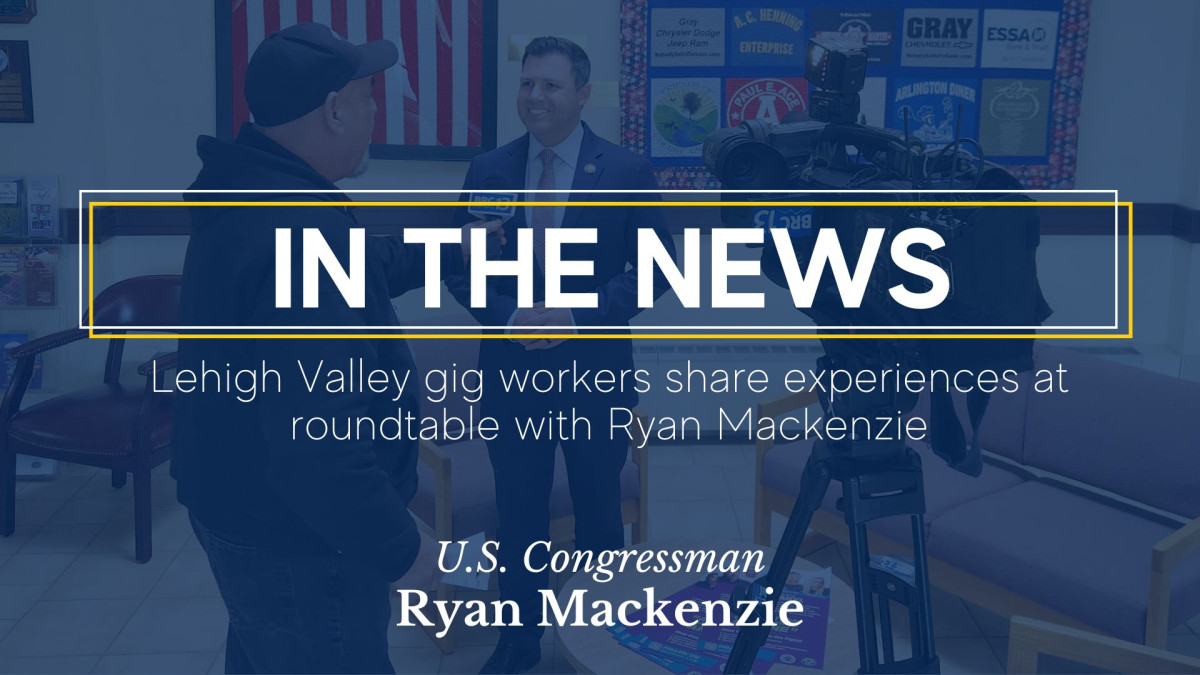‘I can work at my own pace.’ Lehigh Valley gig workers share experiences at roundtable with Ryan Mackenzie

Hector Soto first went to work for delivery company DoorDash out of necessity during the COVID pandemic when hours at his full-time job at a call center dried up.
Even though his primary employer brought him back as the pandemic became less severe, Soto discovered that he liked the way working as an independent contractor allowed him to provide extra income for his family. He also is a fan of the flexibility that allows him to schedule his own hours.
“At my primary job I have to adhere to a structure where you meet certain performance goals that are determined by the employer, so all of it feels like my efforts are going to be the fruits of somebody else’s labor,” said Soto. “When I work with DoorDash, I manage myself. I can work at my own pace.”
Soto’s story as an independent contractor in the Lehigh Valley was part of a roundtable discussion Friday afternoon at Venture X in South Bethlehem hosted by U.S. Rep. Ryan Mackenzie, R-7th District. He was joined by Rep. Tim Walberg, a Michigan Republican and chair of the House Committee on Education and Workforce, along with industry leaders and other local gig workers.
Mackenzie said workers are looking for stability in employment — whether it’s a full-time job that comes with a W-2 form, or as an independent contractor. He said there is legislation in the works to help clear up whether a worker is an independent contractor or an employee, and to allow companies to provide portable benefits to independent contractors.
Keila Rodriguez, an independent Realtor from Northampton, said having the flexibility in her job allows her to have more autonomy and more time to devote to her family and church.
“I was empowered to create space to earn my bachelor’s degree in business administration and still be present for my family,” she said. “So now I have control of my financial future while building a brand that stands out in this competitive market. So this career as real estate agents, or independent contractors, is not just about some homes, but it is also about building a strong foundation for generations to come and inspiring others to do the same.”
Terry Wallace, who owns Venture X — which rents out office and coworking space — previously worked in human resources at Pfizer. He said that after witnessing layoffs of thousands of workers from the pharmaceutical industry, he’s come to the conclusion that a job with a W-2 isn’t any more secure than one as an independent contractor.
“What I can tell you is when I hear people talk about independent contractors, the case against it is striking to me, but I understand where people come from,” he said. “If you wildly oversimplify it, people think it’s security, and an independent contractor is not secure. There has to be a job. They have to get their W-2. They have to get their pay into whatever it might be, but it is not more secure.”
Soto said he has been able to receive portable benefits from DoorDash via a temporary pilot program in Pennsylvania that allows independent contractors to put money toward savings and expenses such as retirement, health insurance and paid time off. Started in 2024 with support from Gov. Josh Shapiro, it allows companies such as DoorDash to have a “safe harbor” and offer the portable benefits without having to classify the contractors as employees.
The legislation to do this on the federal level was introduced in February by Rep. Kevin Kiley, R-California, as the Modern Worker Empowerment Act and the Modern Worker Security Act.
Katherine Rodriguez, head of federal affairs for DoorDash, said Pennsylvania was the first state to have the program. It lasted for six months, and she said the company is putting together the results to share with the state legislature.
“We took a risk by doing it because of the classification standards, but we felt it was really important to take this theory that people have talked about and put it into action,” Rodriguez said, adding that she’d love to see federal legislation move forward.
Mackenzie said the ultimate goal is to give workers a choice in how they earn a living without having to worry about health insurance and other benefits.
“It’s the flexibility,” he said, “because it’s the opportunity to make more money when you want, but maybe it’s also that you want to work less at times or a different schedule at times because you want to go on vacation or care for your family or be with your family.
“I think it’s a false choice to say that you have to have either one or the other. I think we do want to see wage growth in the economy. We’re seeing that under this administration, and at the same time, we can be promoting the optionality of different work situations as well.”
Walberg said it will allow more people to enter the workforce.
“I’m going to give you a platform here, a place to start to accomplish your dream,” Walberg said of apps such as DoorDash, Uber and Lyft. “And then we aren’t having people that are ultimately looking more for welfare if they’re able bodied, if they’re capable, now they’ve got an incentive and an opportunity to step their toes into the water and move forward for a future that they may not have had.”
Also taking part on the panel Friday were Alex Harper from the Pennsylvania Chamber of Business and Industry, Patrice Onwuka from the Independent Women’s Forum, Emily Greene from Americans for Prosperity, and Nancy Dischinat from the Lehigh Valley Workforce Board.